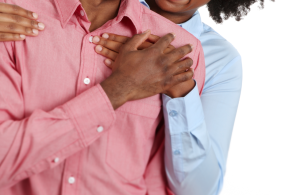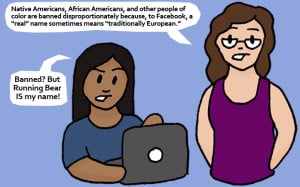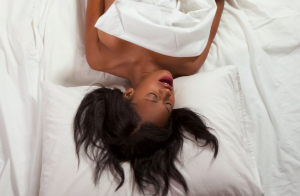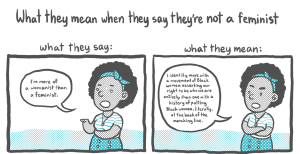(Content Warning: suicide)
Originally published on For Harriet and republished here with their permission.
On April 8th, 2014, a rising star in the black community, Karyn Washington, died by suicide.
According to an article by Buzzfeed, Washington was the originator of the critically acclaimed website For Brown Girls, as well as the #DarkSkinRedLipProject, an initiative that began in response to A$AP Rocky’s comments that “dark-skinned women shouldn’t wear red lipstick.” This movement inspired thousands of women and little girls to find pride in the skin they’re in.
After the tragic passing of her mother in September 2013, she opened up to life coach Ty Alexander to get tips on how to deal with her mother’s passing. While Alexander was able to give a few tips, Washington ultimately subsumed to her depression shortly thereafter.
Recently, a successful talent agent by the name of Eury Davis died by suicide.
She was behind such talent as Jena Sims from Kill the Messenger and actor Christian Martin from the Pirates of the Caribbean film franchise. Despite being a driving force in the entertainment industry, she wasn’t able to extend that same support to herself.
This is the force of depression at work: It torments the mind and distorts one’s ability to truly see, value, and love themselves. At its worst, mental illness can be deadly.
However, black women aren’t the only ones affected; our men are as well.
The death of actor Lee Thompson Young was also shocking. The 29-year-old star of Rizzoli & Isles was found in his apartment with a gunshot wound to his right temple. He allegedly suffered from bipolar disorder and had been prescribed lithium, which was found in his system at the time of the autopsy.
Mental health is an epidemic in the United States. It’s said that one in five people will suffer from some form of mental illness at some point of their lives.
However, intersectionality shows us that mental illness presents differently in the black community.
In order to save lives and create a space where our brothers and sisters can feel supported, friends and family could really benefit from learning the “signs” that appear in black men and women.
In Black Pain: It Only Looks Like We’re Not Hurting, Terri Williams, a public speaker and executive at Essence magazine, details the various ways in which black women exhibit signs of depression. She mentions two primary ways that depression manifests itself: the “bitch” and the “drama queen.”
Through the years I felt like a war was raging inside me compounded by the pain. The “bitch” image had been around for so long that even I believed it. So when soft, sad Karin would take over, all hell would break loose in my psyche… My friends were accustomed to leaning on me in hard times. I think I felt I owed it to them to always be a symbol of strength.
This is a recurring theme for black women.
We often fear our own tenderness, opting instead to develop a “tough” exterior to deal with the pain we face everyday, and to hide our true selves from others.
However, hiding the pain doesn’t lead to relief, only greater shame.
As hard as it may seem, we should begin to tell someone about our problems as opposed to making ourselves appear “bulletproof.”
We often try to cope by creating chaos because it’s a reflection of what we’re dealing with inside.
As Williams says, “Many of us don’t even know when we’re feeling scared, alone, angry, hurt, desperate, sad, or needy, and so when the feelings hit we need a release. The easiest release is a crisis, a confrontation, or a big scene. “
These behaviors are a huge red flag, one that should prompt us to pull our sisters aside and ask “Are you alright?” The dialogue may release her from feeling imprisoned by her emotions.
Men in the black community are also driven to self-destructive behaviors due to severe depression.
Men of color may feel that crying or showing any type of vulnerability or sensitivity is “womanly.” Not only does this lead to suppressing emotions entirely, but it can also be expressed through misogynoir. Of course, emotions are never completely suppressed; instead these feelings come out in other ways: game face, “peacock-ing,” and anger. If their depression goes untreated, our men may also be driven to suicide.
In Black Pain, Terri Williams writes about a young man who also felt that depression was a sign of weakness:
Up [until] then, I’d written depression off [as] weakness, something people had to find a way to face and get on with their lives Besides, I figured, my ancestors had it a lot worse than I did. But I had to reconsider, seeing all these people – men, women, and children – flowing through the doors of therapists’ posh offices and freeing themselves of their deepest darkest pain.
The “game face” is the stoic demeanor that men put on to hide the pain they’re feeling. According to Williams, this just leads to them feeling more disconnected from each other as a result.
The natural consequence of this lies in men hardening their hearts, or trying to cope through alcoholism, violence, or other destructive behaviors – including suicide by proxy, or consistently putting oneself in situations where death is bound to occur. (For example: carrying a gun and provoking the police to act, which is highly likely considering the rampant state-sanctioned police violence against black people.)
It’s important for friends, family members, and loved ones to be familiar with the many possible signs of depression and suicidal behavior.
Knowing how someone may act when they’re in trouble could save their life.
For example, random and unexplained surges of anger or irritability; social withdrawal; and individuals giving what seems like an odd or final “goodbye” gesture – like giving extremely valuable or personal items away – are all signs that someone may be thinking about ending their own life.
If a person seems sad for prolonged periods and all of a sudden “snaps out of it” and appears to be happy, one should reach out and talk to them. This new happiness may signal relief or resolve that they’ve set a plan for taking their own life.
At the end of the day, we need to be more accountable to ourselves and our brothers and sisters when it comes to mental and emotional health.
We most definitely are each other’s keepers. We should not only think about suicide prevention and mental health issues when a celebrity or well-loved public figure takes their own lives. Instead, we should be vigilant everyday about supporting the mental health and well-being of those in our community.
Please check out the following list of mental health resources:
- National Mental Illness Alliance (NAMI)
- Depression and Suicide Symptoms in the Black Community
- Black Pain: It Only Looks Like We’re Not Hurting by Terri Williams
- Psychology Today: Lists of Various Mental Illnesses and Articles
And if you or someone you know is contemplating about suicide, calling the National Suicide Prevention Lifeline at 1.800.273.8255 or dialing 911 could be lifesaving. Folks outside the US can find a suicide prevention directory here.
[do_widget id=’text-101′]
Anna Gibson is a freelance writer and social activist who seeks to write about the stories of the marginalized. You can reach her @TheRealSankofa on Twitter or on Facebook under the name Anna Gibson. Check out her website here.
Search our 3000+ articles!
Read our articles about:
Our online racial justice training
Used by hundreds of universities, non-profits, and businesses.
Click to learn more





















